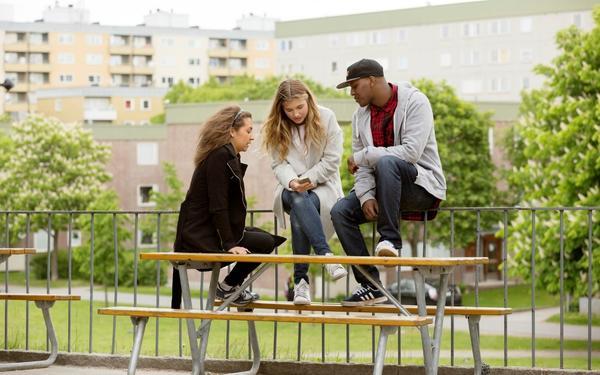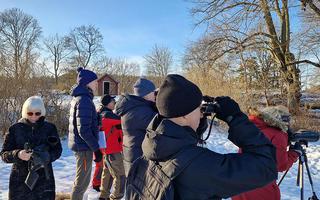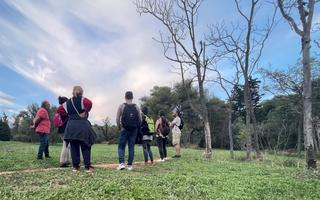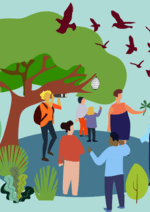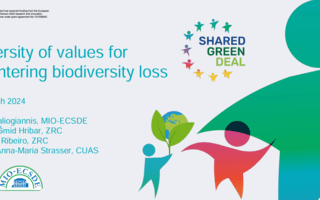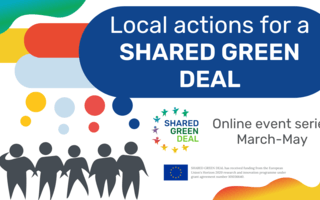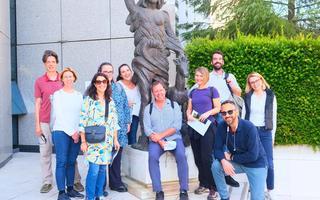Stockholm Biodiversity Learning Experiment - by participating and doing (SBLE)
With the support from the SHARED GREEN DEAL project, Stockholm tested new ways to increase the knowledge about biodiversity among residents not-so-familiar with the concept of biodiversity and the benefits of ecosystem services, following an approach based on both intellectual and sensory, emotional knowledge by direct, own experiences. It helped them understand better the needs of the residents of Stockholm, what is the role that biological diversity plays in the city, and in what way our society depends on it.
Local context
The Biodiversity Action Plan of the City of Stockholm was adopted by the City Council on November 30, 2020. The Action Plan introduces five strategies to strengthen nature in the city. One of the strategies focuses on developing knowledge about biodiversity and how the city's different ecosystems are prioritized, managed and cared for. Their 12 Nature Reserves, the National City Park, a Cultural Reserve, all serve as core areas for biodiversity. The green routes passing through the city are very important for biodiversity connectivity, stretching between the city center to semi-rural areas.
Specific needs and challenges
The knowledge among the local inhabitants about the importance of biodiversity in the city and how this offers benefits for humans (ecosystem services) needs to be enhanced. In addition, by active involvement, sharing of experiences and knowledge building through this experiment, participants are expected to be more actively involved in protecting and managing biodiversity. The participants came from an area which is considered socially vulnerable and is demographically diverse. The unemployment rate in the area is high, and the need for more social inclusion is evident. Adult education programs can help facilitate this need for change.
Detailed description of the experiment
The experiment developed an adult education programme which extended to the families of the participants, based on the four pillars of "Flow learning": awakened enthusiasm, focused attention, direct experiences and shared inspiration.
Through a series of biodiversity walks and learning activities took place both in urban and nature/cultural reserve settings, and highlighted the existing values and views of nature. By gaining knowledge about nature's own laws, processes and significance, a deeper understanding of individual and common responsibility on protecting and restoring it was to be cultivated.
Partners
The local city district administration of Rinkeby-Kista was to be involved, along with the Study circle association "SV", nature School "Eggeby gård" and local bird life and nature organisations.
The Environment and health administration at the City of Stockholm have extensive experience on managing biodiversity and have been involved in implementing the city's biodiversity action plan, where communication and involvement of local residents is an integral part. Stockholm's local city district administration of Rinkeby-Kista is responsible for contacting the local park rangers and is the focal point between local residents, city workers and politicians. They also offer work opportunities for young adults during summer, a target group which is aimed to be involved in our social experiment. The Nature School "Eggeby gård" was to serve as a meeting point, as well as a source for providing all material needed for the studies of biodiversity
Local partner
Environment and health department, City of Stockholm
Country
Sweden
Number of inhabitants
975,500
City
City of Stockholm
Website/social media
Contact person:
Peter Wibornpeter [dot] wiborn [at] stockholm [dot] se
Related Green Deal Priorities
TIMELINE
Case Study Guides
|
Find out more


CONTACT
For further details please contact co-leads Professor Chris Foulds (chris.foulds@aru.ac.uk) and Professor Rosie Robison (rosie.robison@aru.ac.uk).

This project has received funding from the European Union’s Horizon 2020 research and innovation program under grant agreement No 101036640. The sole responsibility for the content of this website lies with the SHARED GREEN DEAL HAS project and does not necessarily reflect the opinion of the European Union.
